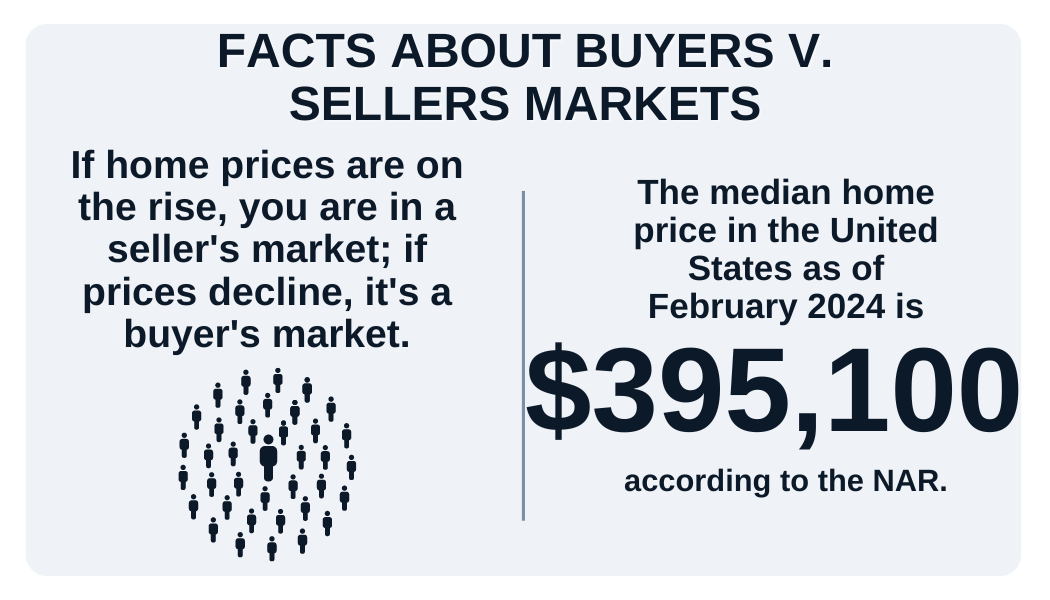Buyers Market Vs. Sellers Market: Understanding The Difference

Buyers Market Vs. Sellers Market: Understanding The Difference
Are you wondering what the differences are between the buyer's market and the seller's market? Keep reading to understand more about buyers' and sellers' markets.
The housing market can be a confusing thing to understand and navigate. Various factors determine whether the housing market is a seller or buyer market. Understanding these factors will help you know which side the market favors to help you save and make money.
Knowing the difference and acting on that can help you in home sales, whether you are the seller, buyer, or doing both of these. Shifts in supply and demand can create a buyer's market or seller's market for almost anything.
A buyer or seller market is part of trends in real estate and can give you advantages as well as disadvantages. These may reflect the changes in demand for homes in specific areas.
Understanding the market conditions that create a buyer's market or a seller's market can help you determine your timing and what your plan of action will be when buying or selling a home. If you are intersted in moving soon or selling, keep reading to learn the differences and understand what each market is.
Here is what you should know about the differences between buyer and seller markets.
Chapters
1. What Is a Buyer's Market?
A buyer's market is one in which the supply of homes is abundant, houses take longer to sell, and home prices are flat or declining. In this market, it tends to be more challenging for homeowners to sell their properties, and that gives buyers a better choice and opportunity to strike at cheaper prices.
Real estate inventory is high, and these conditions give buyers leverage over sellers because when supply is high and demand is low, the market is forced to respond.
Real estate prices will decrease, and homes will linger on the market longer, so sellers must compete with each other to attract potential buyers. Typically, sellers will drop asking prices to gain advantages.

If you are a seller:
- Price your home realistically
- Spruce your home up
- Stage for success
- Be flexible about closing cost
- Make necessary repairs
- Market it like a pro
If you are a buyer:
- Take time to consider all options
- Priotize the concessions you want
- Know what is all available
- Analyze comparable properties
- Pay attention to the days on the market
2. What Is a Seller's Market?
A seller's market arises when demand exceeds supply. There are many interested buyers, but the real estate inventory is low, so fewer homes are available. In this market, sellers are at an advantage.
In a seller's market, homes will sell faster, and buyers must compete with each other to score the property. These market conditions often make buyers willing to spend more on a home than they usually would, so sellers tend to raise their asking prices.
Homes in the sellers' market also tend to stay on the market for a shorter amount of time, making it easier for sellers to close and move on. A seller market exists when people who want to sell their homes have more negotiating power than prospective buyers.
Much of the United States is experiencing a seller's market today because of a nationwide housing shortage, so the median price for a pre-owned home has been at an all-time high.
If you are a seller:
- Pretend it is not a seller's market
- Avoid giving a deadline for reviewing offers
- Be realistic about offers that exceed the asking price
- Review all offers carefully
- Be aware of contingencies
- Ensure the buyer's mortgage approval early on
If you are a buyer:
- Act fast
- Know you're at a disadvantage
- Be patient
- Do not settle
- Get mortgage preapproval
- Consider bidding more than the asking price
- Consider boosting your earnest money deposit
- Be prepared for rivals who pay in cash
3. How to Determine What Market You're In

If you are wondering what market you are in, your real estate agent can let you know. On the other hand, there are many things that indicate what housing market you are in.
Real Estate Inventory
You can quickly determine whether you are in a buyer or seller's market by evaluating the real estate availability. If you find that your region has a high housing inventory, you are more likely to be in a buyer's market. Fewer homes available in the area will indicate a seller's market.
You can get the most accurate inventory by dividing the number of homes currently listed on the market by the number of homes that have sold over the last month.
Pricing
One of the most straightforward indicators is the current asking prices. Sellers are likely to reduce their asking price in a buyer's market and raise them in a seller's market. When you are looking at these housing prices, make sure you look at the trends rather than one home to get the most accurate idea of the market.
You can also learn about market conditions by looking at interest rates. Lower mortgage interest rates enable more buyers to enter the marketplace, creating an influx in demand, which leads to a seller market. Higher interest rates make people back out of the market, benefiting buyers.
Recent Sales
Looking at how much money other properties have sold in recent weeks and comparing it to your home value is a great way to determine the housing market. Make sure the houses are comparable to your home. Look at bedrooms, size, location, and age. Determining if buyers have purchased other homes at higher or lower prices than your home value will be beneficial for you.
If comparable homes have been sold for or above the asking price, then you are in a seller's market, while if houses that sold for less than the asking price, then you are in a buyer's market.
Days on Market
How long a home stays on the market is a strong indicator of the real estate market. Houses that sell quickly in a seller's market are due to high housing demand, while if they remain on the market for longer in a buyer's market, then demand is low. You can determine which market you are in by monitoring these listings on the local market.
Market Absorption Rate
Market absorption is the number of months it will take to sell every home currently listed on the market. You can use this rate to measure the demand in the current market.
To calculate, divide the number of homes sold within a given period, usually by months, by the number of total homes currently available on the market. A market absorption rate bigger than 20% means you are in a seller's market, while rates below 15% mean you are in a buyer's market.
Evaluating all of these influences can be time-consuming, especially if you do not understand the housing market. If you are lost in all of it, consulting a local real estate agent who knows that specific area may be helpful. Markets are constantly changing, so if you are intersted in buying or selling anytime soon, start looking at the trends to get a better understanding.
4. Main Differences

You do not need a real estate professional to tell you what market you are in. Keeping an eye on the current and recent listings can help you tell what market you are in. Here are some significant market characteristics that you can use to describe what market to buy quickly.
Characteristics of a Buyer Market:
- Homes sell slow
- Homes sell at or below the listing price
- Home prices are decreasing
- There are a lot of homes on the market
Characteristics of a Sellers Market:
- Homes sell very fast
- Homes sell at or above the listing price
- Home prices are increasing
- There are fewer homes on the market
5. Home Search Process
According to the National Association of Realtors, here is some data about the home search process.
- About 41% of recent buyers, the first step they took into the home buying process was looking online at properties
- 20% of buyers' first time in the home buying process contacted a real estate agent first
- 90% of recent buyers found their real estate agent to be a very/somewhat usual information source
- Buyers typically searched for 10 weeks and looked at a median of 7 homes and viewed four homes only online
- All home buyers used the internet to search for a home
- Most valuable content on websites were photos, details about the property, floor plans, and agent contact information
- 92% of recent buyers were at least somewhat satisfied with their recent home-buying process

The home buying process can seem very scary, but overall, if you understand the housing market you are in, do your research, and have a trustworthy real estate agent, then the process should be somewhat easy.
Keep in mind the housing market is constantly changing for many reasons, so keeping up with the market trends in your area and the Unitied States can help you decide whether or not you want to move and which location is best for you.
Methodology
We used information and data from several different sources as well as our own data to create this guide about understanding the differences between buyers' markets and sellers' markets. Most of the data was sourced from the following sources:
Above are a few sources that we used to gather most of our information about understanding the differences between buyers' markets and sellers' markets.
FAQS
What is an example of a seller's market?
A seller market is often used to describe a shortage of properties in the face of healthy demand. The seller of a home in an area with a good school system and limited inventory would have control over the home prices.
What is a buyer's market example?
A buyer market happens when supply exceeds demand. In content, real estate inventory is high, and there are a lot of houses for sale, but there is a shortage of intersted home buyers in the market.
What are the current supply trends in the US housing market?
As of February 2024, existing home sales surged by 9.5%. With a 3-month supply of unsold inventory, demand exceeds supply, giving sellers an advantage. The median existing-home price is now at an all-time high of $379,100.
How would you explain the difference between a buyer and a seller?
Buyers demand goods and services, and sellers supply those. Markets exist with the interaction of buyers and sellers, and this interaction describes market prices and trends.

Buyers Market Vs. Sellers Market: Understanding The Difference - The Bottom Line
Real estate markets cycle and change over time depending on many different factors. Understanding each type of market and the strategies behind it can help you get the best deals on home sales, no matter which side the market is leaning on.
When buying or selling a property, it helps to know the market. As a seller, you will want to list your home when the market is a seller's market so there is less competition with a higher demand of buyers, while if you are buying, you will want to do it in the buyers' market because there will be more inventory.
If you are looking to buy a home, a seller's market should not scare you, but it can help you. So, evaluating the market and the indicators is essential and may seem time-consuming, but once you understand it, it will only help you.
If you are considering moving or selling, contact us or visit our website. Our team at Raleigh Realty is here to help you with any home buying or selling needs.

Ryan Fitzgerald
Hi there! Nice to 'meet' you and thanks for visiting our Raleigh Real Estate Blog! My name is Ryan Fitzgerald, and I'm a REALTOR® in Raleigh-Durham, NC, the owner of Raleigh Realty. I work alongside some of the best Realtors in Raleigh. You can find more of my real estate content on Forbes, Wall Street Journal, U.S. News and more. Realtor Magazine named me a top 30 under 30 Realtor in the country (it was a long time ago haha). Any way, that's enough about me. I'd love to learn more about you if you'd like to connect with me on Facebook and Instagram or connect with our team at Raleigh Realty. Looking forward to connecting!
Related Blogs





